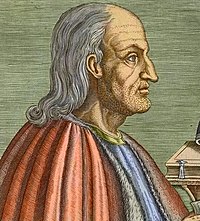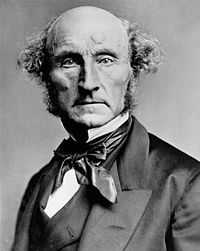British philosophy
"The native characteristics of British philosophy are these: common sense, dislike of complication, a strong preference for the concrete over the abstract and a certain awkward honesty of method in which an occasional pearl of poetry is embedded".
Anselm's works are considered philosophical as well as theological since they endeavour to render Christian tenets of faith, traditionally taken as a revealed truth, as a rational system.
These are the first known works to deal in a systematic way with what is now called supposition theory, and were influential on the development of logic in both England and on the continent.
He is sometimes credited as one of the earliest European advocates of the modern scientific method[4] inspired by the works of Plato and Aristotle via early Islamic scientists such as Avicenna and Averroes.
This actual term is claimed not to appear in his writings,[9] but rather summarizes the principle he expressed in passages such as Numquam ponenda est pluralitas sine necessitate [Plurality must never be posited without necessity][10][11] and Frustra fit per plura quod potest fieri per pauciora (It is futile to do with more things that which can be done with fewer).
The words often attributed to Occam: entia non sunt multiplicanda praeter necessitatem ("entities must not be multiplied beyond necessity") are absent in his extant works;[13] This particular phrasing comes from John Punch who used it in describing a "common axiom" (axioma vulgare) of the Scholastics.
His demand for a planned procedure of investigating all things natural marked a new turn in the rhetorical and theoretical framework for science, much of which still surrounds conceptions of proper methodology today.
His 1651 book Leviathan established the foundation for most of Western political philosophy from the perspective of social contract theory.
[16] Hobbes was a champion of absolutism for the sovereign but he also developed some of the fundamentals of European liberal thought: the right of the individual; the natural equality of all men; the artificial character of the political order (which led to the later distinction between civil society and the state); the view that all legitimate political power must be "representative" and based on the consent of the people; and a liberal interpretation of law which leaves people free to do whatever the law does not explicitly forbid.
[17] Hobbes also contributed to a diverse array of fields, including history, geometry, physics of gases, theology, ethics, general philosophy, and political science.
The three 'classic' British empiricists in the early modern era were John Locke, George Berkeley, and David Hume.
John Locke embodied the idea of religious tolerance and said "no mans knowledge can exceed his experience" based on his background in epistemology.
Many of his most important ideas were first put forth in A Treatise Concerning the Principles of Human Knowledge, a work which was critical of John Locke's philosophy.
After graduating, he delivered a successful series of public lectures at Edinburgh, leading him to collaborate with David Hume during the Scottish Enlightenment.
Two British philosophers, G. E. Moore and Bertrand Russell, were brought up in this tradition and then reacted against it by pioneering analytic philosophy.
Analytic philosophy was based on traditional British empiricism, updated to accommodate the new developments in logic pioneered by German mathematician Gottlob Frege.
[25] Moore is best known today for his defence of ethical non-naturalism, his emphasis on common sense in philosophical method, and the paradox that bears his name.
He was admired by and influential among other philosophers, and also by the Bloomsbury Group, but is (unlike his colleague Russell) mostly unknown today outside of academic philosophy.
Moore's essays are known for his clear, circumspect writing style, and for his methodical and patient approach to philosophical problems.
He was critical of philosophy for its lack of progress, which he believed was in stark contrast to the dramatic advances in the natural sciences since the Renaissance.
He often praised the analytic reasoning of Thales of Miletus, an early Greek philosopher, for his analysis of the meaning of the term "landscaping".
Among his most famous works are his book Principia Ethica, and his essays, "The Refutation of Idealism", "A Defence of Common Sense", and "A Proof of the External World".
[27] He co-authored, with Alfred North Whitehead, Principia Mathematica, an attempt to derive all mathematical truths from a set of axioms using rules of inference in symbolic logic.
Later, he campaigned against Adolf Hitler, then criticised Stalinist totalitarianism, attacked the United States of America's involvement in the Vietnam War, and finally became an outspoken proponent of nuclear disarmament.
[31] In 1950, Russell was awarded the Nobel Prize in Literature, "in recognition of his varied and significant writings in which he champions humanitarian ideals and freedom of thought.
This approach typically involves eschewing philosophical theories in favour of close attention to the detail of everyday language.
Recent British philosophers particularly active in the philosophy of religion have included Antony Flew, C. S. Lewis, and John Hick.





